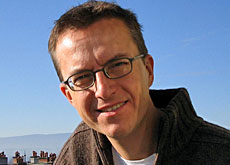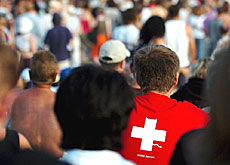Government calls for naturalisation changes

The Swiss government has called on cantons to harmonise naturalisation procedures, but it will not alter the 12 years' residency necessary to apply for citizenship.
The government says it favours extending from five to eight years the period during which naturalisation obtained under false pretences can be annulled.
The recommendations are part of a report, published on Friday by the Federal Migration Office, which the government commissioned in 2004 after a failure at the polls.
In September 2004 Swiss voters sided with the rightwing Swiss People’s Party on the issue of citizenship, rejecting two parliament-backed proposals which would have made it easier for young foreigners to become Swiss.
The first sought to speed up the naturalisation procedure for people aged 14-24; the second sought to grant automatic citizenship to children born in Switzerland of foreign parents.
Justice Minister Christoph Blocher – a member of the Swiss People’s Party – explained on Friday that the 2004 result was why the government had decided not to lower the time foreign residents must wait before being eligible to apply for citizenship.
But he called on cantonal authorities to take into consideration time already spent in other cantons, saying it was “shocking” that someone who had lived in Switzerland for 12 years but who then moved to another canton would have to wait another five to 12 years before being able to apply for citizenship.
If no harmonisation took place, a federal law would take care of the issue, Blocher said.
The government also called on cantons to simplify their procedures for dealing with various authorities to cut down on duplications.
Abuse
The government expressed a particular desire to improve efforts in the fight against system abuse.
It proposed changing the law so that naturalisations obtained through deceit could be annulled after up to eight years rather than the current five, after which time nothing can be done.
Blocher made clear that during the debate the government had not tackled the subject of criminality among young foreigners. This would be broached separately as part of an integration project expected later this year, he said.
Local autonomy
The government’s recommendations go against recent trends. In addition to the 2004 rejection at the polls, the Swiss People’s Party previously launched a campaign to enshrine the right of citizens to decide on naturalisation requests in the constitution, effectively upholding autonomy of the local councils.
The issue led to a nationwide debate a few years ago when voters in the town of Emmen near Lucerne turned down applicants from the Balkans, apparently only on the basis of their ethnic background. This pattern was repeated in other parts of central Switzerland.
The Federal Court later ruled that rejected citizenship applications must be justified, effectively banning local votes on naturalisation procedures.
swissinfo with agencies
There are 500,000 people born to immigrant parents in Switzerland.
About one-third have become Swiss nationals.
A first-generation immigrant is someone who has moved to Switzerland, after being born elsewhere.
A second-generation immigrant is born to first-generation immigrants.
Foreign residents must wait at least 12 years before being eligible to apply for citizenship.
Foreigners married to Swiss nationals can take advantage of a simplified or “facilitated” procedure, reducing the number of years they have to wait (see related site, Federal Migration Office).
Successful applicants must show that they are integrated into Swiss society, comply with Swiss law and pose no threat to internal or external security.
The cantonal and local authorities are responsible for naturalisation procedures.
In 2005, a record 39,753 applications were accepted.
There are 1.5 million foreigners currently living in Switzerland, out of a total population of seven million people.

In compliance with the JTI standards
More: SWI swissinfo.ch certified by the Journalism Trust Initiative












You can find an overview of ongoing debates with our journalists here . Please join us!
If you want to start a conversation about a topic raised in this article or want to report factual errors, email us at english@swissinfo.ch.